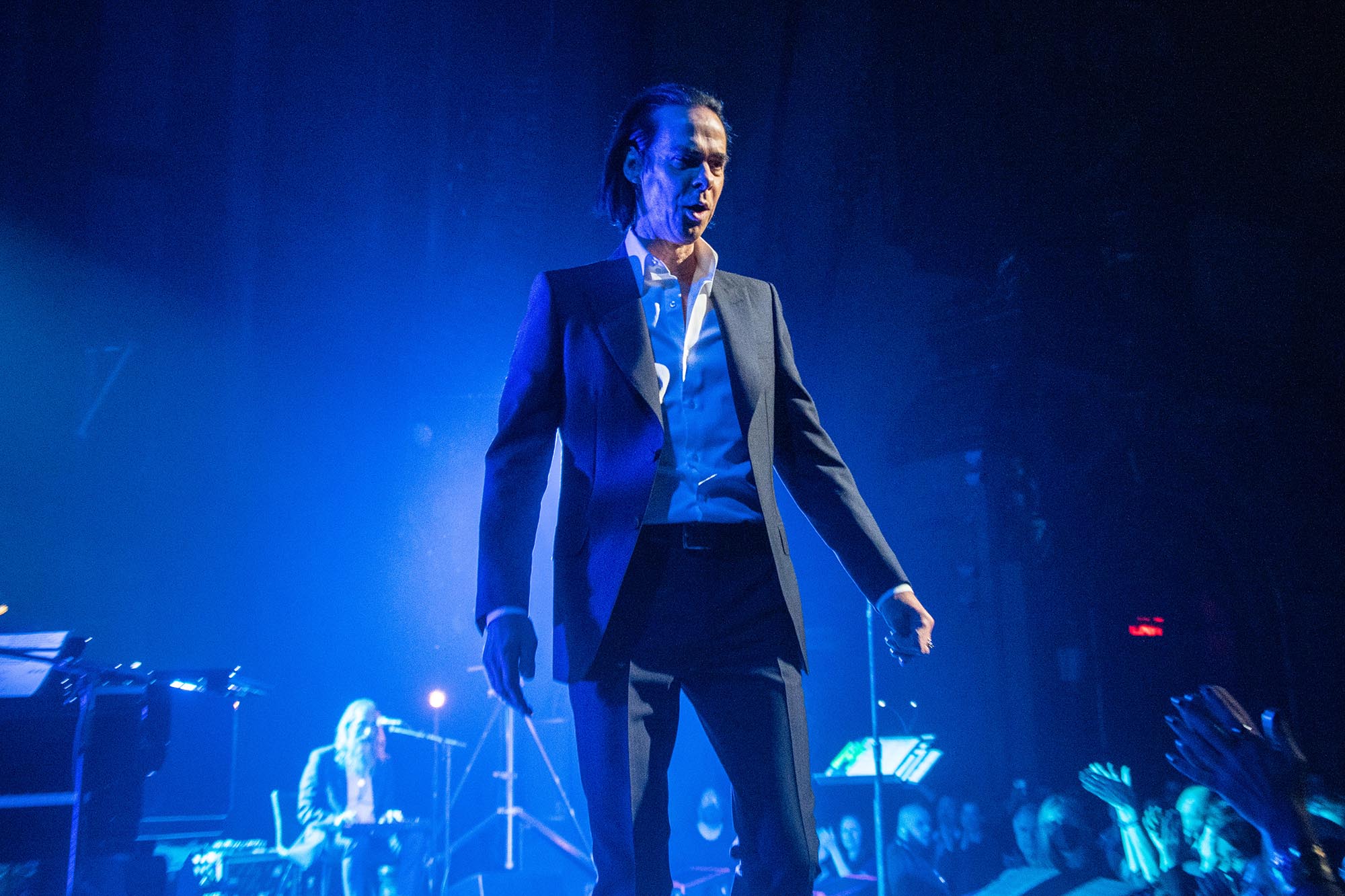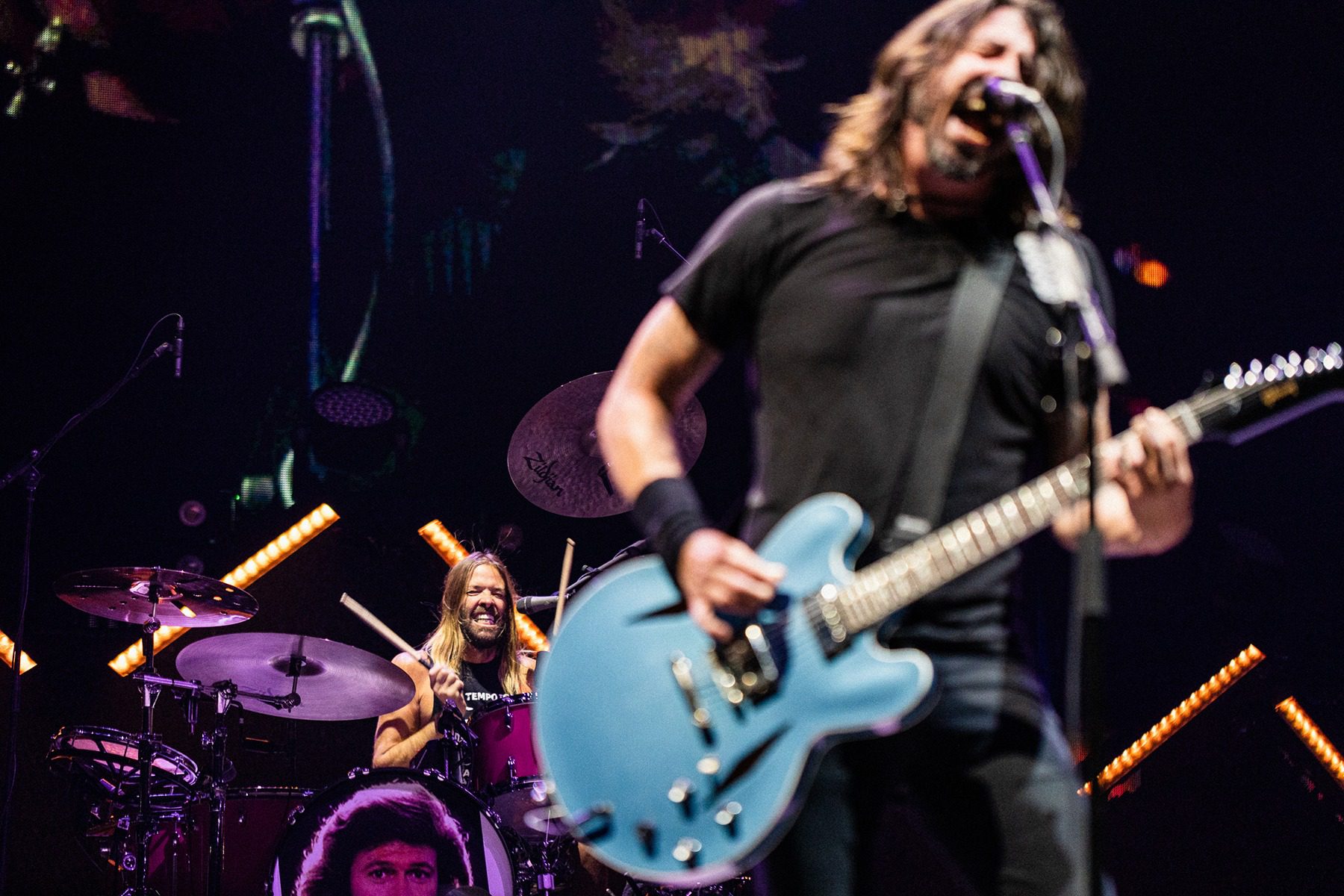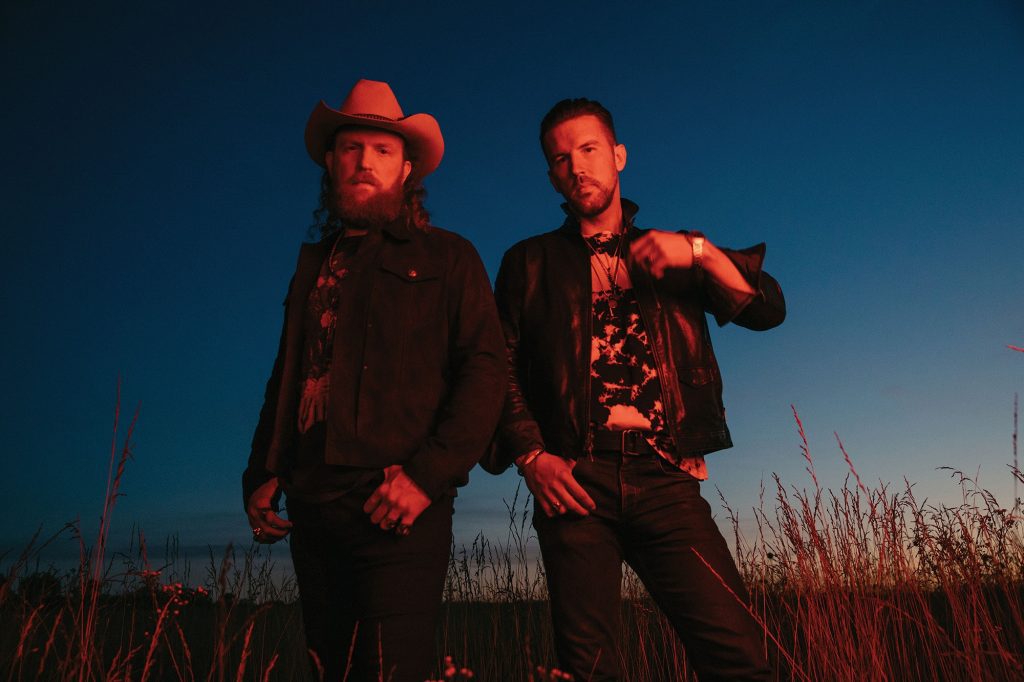
Nick Cave and Warren Ellis’ ‘Carnage’ Concerts Are Better Than Church
Three singers huddle and lean forward, their long, sparkly garments dangling before them as they chant in staccato unison: “Hand-of-God! Hand-of-God! Hand-of-God!” Warren Ellis, meanwhile, sits stationary except for his hands, which run windmills around his Gandalf beard as he closes his eyes tight and chants along with them, completely entranced. All the while, Nick Cave — the rangy leader of this ad-hoc religious sect — leaps from one side of the stage to the other. He crouches, poses in crucifixion stances, and celebrates the might and mysteries of faith like a man possessed. The ensemble is no cult, but submitting to its collective rapture is better than church.
This past weekend, Cave and Ellis — violinist for instrumental Aussie rockers the Dirty Three and Cave’s collaborator for about three decades in the Bad Seeds, Grinderman, and other projects — held four concerts that felt like spiritual revivals at Brooklyn’s King’s Theatre and Manhattan’s Beacon Theatre, and the two shows I attended were truly transcendent. (The tour continues Thursday in Toronto.) A few years back, Cave entered a stunning new phase of artistry on Skeleton Tree, his 2016 album with longtime backup band the Bad Seeds. Decimated emotionally by the unexpected 2015 death of his teenage son, the already gothic-prone Cave recorded his saddest elegies to date as he worked through his sorrow.
blogherads.adq.push(function () {
blogherads
.defineSlot( ‘medrec’, ‘gpt-dsk-tab-article-inbody1-uid0’ )
.setTargeting( ‘pos’, [“mid-article”,”mid”,”in-article1″,”mid-article1″] )
.setSubAdUnitPath(“music//article//inbody1”)
.addSize([[300,250],[620,350],[2,2],[3,3],[2,4],[4,2],[640,250]])
;
});
Three years later, a few months before the onset of the global pandemic, Cave and the Bad Seeds released Ghosteen, a masterful cycle of songs that represented his first true reckoning with his grief and his search for peace. And then last year, he and Ellis put out Carnage, a treatise on enduring hardship that anyone who had survived the past two years could understand, which begins with the canticle “Hand of God.”
This trilogy of albums provided most of the material in the set lists for Cave and Ellis’ concerts, and their songs guided audiences through feelings of despair, hope, and joy, something like a homecoming after three years of universal anguish. As master of ceremonies to this emotional awakening, Nick Cave has reached a new peak.
Perhaps most impressive is how Cave and Ellis were able to summon so much drama with a smaller group of musicians. Bad Seeds concerts sometimes feature as many as 12 people onstage, a virtual rock orchestra, but these engagements featured only Cave, Ellis, the backup singers (Janet Ramus, Wendi Rose, T. Jae Cole), and multi-instrumentalist Luis Almau (who somehow didn’t get the memo that all good Bad Seeds wear suits). Most of the music at the concerts emanated from Ellis’ synthesizer, which creates a warm, gauzy sound that’s easy to get lost in (perhaps this was “Nick Cave and the Badalamenti Seeds”?) — especially when it leaps out from a theater’s PA system and enfolds you during Ghosteen songs like “Night Raid” and “Galleon Ship.” The synth throbs hypnotically on “Carnage” as Cave and the singers observe, “It’s only love with a little bit of rain, and I hope to see you again.”

Nick Cave at New York’s Beacon Theatre on Sunday.
Sacha Lecca for IndieLand
But it’s the moments of tenderness that shone the brightest during the concerts. Cave’s voice broke as though he were privately weeping while singing and playing piano onstage during Ghosteen’s “Waiting for You,” which got its live debut on the Cave/Ellis tour, as he sang about how “your body is an anchor, never asked to be free/[I] just want to stay in the business of making you happy.” And the shuffling Skeleton Tree song “I Need You” sounded heartbreaking in its pared-down arrangement, as Cave sang about how “nothing really matters when the one you love is gone.” Performed one right after the other, these two songs made for moments of mutual vulnerability between the musicians and the audience.
Meanwhile, Ghosteen’s harrowing 15-minute “Hollywood” pulverized the crowd as Cave tiptoed about the front of the stage, holding hands with fans as he recounted the Buddhist legend of a North Indian woman named Kisa Gotami begging villagers and Buddha to help her baby, which had died. In between speaking to the audience, Cave and the backup singers broke into moments of melody: “Everybody’s losing someone, it’s a long way to find peace of mind.” At the King’s Theatre show, he dedicated Skeleton Tree’s “Girl in Amber” to founding Bad Seed and his onetime girlfriend Anita Lane, who died almost a year ago. And he invoked the late producer Hal Willner before performing a slow, thoughtful rendition of T. Rex’s “Cosmic Dancer” that featured a brilliant violin solo that Ellis played while lying on his back on a chair. (“You’ll be telling your grandchildren about this,” Cave promised the audience of Ellis’ lead break.)
blogherads.adq.push(function () {
blogherads
.defineSlot( ‘medrec’, ‘gpt-dsk-tab-article-inbody2-uid1’ )
.setTargeting( ‘pos’, [“mid-article2″,”mid”,”in-article2″,”mid-article”] )
.setSubAdUnitPath(“music//article//inbody2”)
.addSize([[300,250],[300,251],[620,350],[2,4],[4,2],[3,3],[2,2]])
.setLazyLoadMultiplier(2)
;
});

Cave and Ellis at the Beacon Theatre
Sacha Lecca for IndieLand
But the shows weren’t entirely dire. On “White Elephant,” an indictment of white supremacy from Carnage, the song breaks away for Cave and the backup singers to croon, “A time is coming, a time is nigh/For the kingdom in the sky,” as if God were truly in the house. A rare performance of “Henry Lee,” Cave’s PJ Harvey duet from 1996’s Murder Ballads, proved to be a showstopper thanks to Ramus handling Harvey’s part with her deep, ominous voice. And Cave broke things up with the whimsical Bad Seeds song “God Is in the House,” about a small town so besotted with religious fervor that nothing bad could ever possibly happen there, punctuated by Cave whispering to the audience to “quietly shout” along with him.
At the two concerts I attended, during Carnage’s “Balcony Man,” he encouraged the audiences suspended above the floor to scream anytime he said “balcony” as if it were Pee-wee’s Playhouse‘s secret word, and the response was especially loud at the Beacon. That song also contained Cave’s twist on Nietzsche’s old saw about persevering through hardship: “What doesn’t kill you just makes you … crazier.”
It’s the type of lyric that makes you want to laugh and cry at the same time as you realize you’re living it every day. If this new incarnation of Nick Cave is some kind of faith healer, by the end of the show, his spell worked. It would be hard to walk away from concerts like these and feel the same as when you went in.




